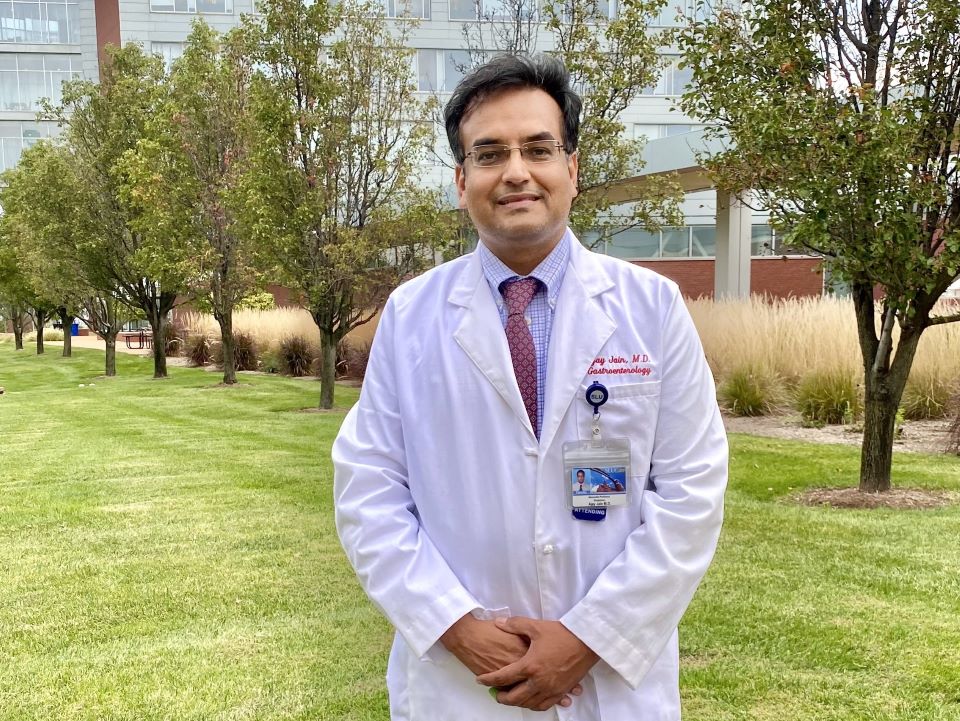SLU Researcher Awarded $1.9M NIH Grant to Study Short Bowel Syndrome
Bridjes O'Neil
Communications Specialist
bridjes.oneil@slu.edu
314-282-5007
Reserved for members of the media.
A Saint Louis University School of Medicine researcher has received a grant to study Short Bowel syndrome (SBS).
Ajay Jain, M.D., professor of pediatrics, pharmacology, and physiology, received $1,893,750 from the National Institute of Diabetes and Digestive and Kidney Diseases of the National Institutes of Health.
Bowel resection, a surgical procedure in which a diseased part of the intestine is removed, leads to SBS. Patients with SBS cannot maintain nutrition through regular feeding due to insufficient intestines. Such patients, in the absence of food, require intravenous nutrition via a process called Total Parenteral Nutrition (TPN), Jain said.
There are tens of thousands of patients worldwide permanently dependent on TPN for their survival. These include adults, children, and newborn babies. Despite being on a lifesaving TPN therapy, SBS patients suffer from potentially fatal liver and gut injury with many patients requiring a multi-visceral transplant. Thus, this is a major research focus in gastroenterology and hepatology, Jain said.
He further states that results from their novel studies highlight that altered gut-derived signals play a major role in driving injury mechanisms in SBS.
"If we could restore these signaling pathways, then we could bring a paradigm change in the management and care of these patients,” Jain said.
This NIH grant will evaluate the impact of novel molecules that he has been working on in preclinical models, to test their efficacy in mitigating the multisystem injury in SBS. He will also explore new signaling pathways that would open a new area of therapeutic targeting.
As part of this funding, Jain will also use organoids, a highly specialized technique where organs are grown in the lab for further validation and to gain mechanistic insights.
“We believe that we are on the verge of creating sustainable options for our sickest patients with SBS with our translational research and such could prove transformative not only as a treatment but advance science in unlocking the mysteries of the gut to systemic signaling, with far-reaching consequences,” Jain said.
An internationally recognized expert, Jain has received national and international awards for his work. This year, Jain was awarded the Gerard Odell Prize for Excellence in Liver by the North American Society for Pediatric Gastroenterology, Hepatology and Nutrition. He was also recently awarded the international Stanley Dudrick Award from the American Society for Parenteral and Enteral Nutrition.
The prestigious $1.9 million grant builds on previous research Jain has conducted.
Jain has also received grant funding from the National Institutes of Diabetes and Digestive and Kidney Diseases; the North American Society for Pediatric Gastroenterology Hepatology and Nutrition; the American Society of Parenteral and Enteral Nutrition Rhoads Research Foundation; the American Liver Foundation; Mid-America Transplant Foundation and industry partners. Additionally, seed funding through SLU's Liver Center and President's Research Fund allowed Jain to conduct early proof-of-concept studies.
Jain serves as the director of the M.D./Ph.D. program for SLU’s School of Medicine. He is also a professor of pediatrics in the Division of Pediatric Gastroenterology Hepatology and Nutrition in the SLU School of Medicine. He is a SLUCare pediatric hepatologist and gastroenterologist, the associate division chief of pediatric gastroenterology and the medical director of the pediatric liver transplant program at SSM Health Cardinal Glennon Children's Hospital.
About Saint Louis University School of Medicine
Established in 1836, Saint Louis University School of Medicine has the distinction of awarding the first medical degree west of the Mississippi River. The school educates physicians and biomedical scientists, conducts medical research, and provides health care on a local, national and international level. Research at the school seeks new cures and treatments in five key areas: infectious disease, liver disease, cancer, heart/lung disease, and aging and brain disorders.
Related News


















